Background
Amartya Sen was born on November 3, 1933, in Santiniketan, India. Sen's father, Ashutosh, was a professor of chemistry at Dhaka University, and his mother, Amita, was a writer; she also edited a literary magazine in Bengal, India.

2009
Cambridge, England
Economist Amartya Sen poses for photographs during the Asahi Shimbun interview on February 10, 2009, in Cambridge, England.
2010
Bologna, Italy
Indian economist Amartya Sen, the Nobel Economics laureate in 1998, speaks at a conference at the Commerce Chamber on May 25, 2010, in Bologna, Italy. (Photo by Roberto Serra)
2010
New Delhi, India
Nobel laureate Amartya Sen attends the Nalanda Mentor Group (NMG) meeting in New Delhi on August 3, 2010. (Photo by Subir Halder)
2013
New Delhi, India
Nobel laureate and economist professor Amartya Sen giving an inaugural lecture at the launch of the International Centre For Human Development on January 4, 2013, in New Delhi, India. (Photo by Pradeep Gaur)
86, 1, College St, Calcutta University, College Square, Kolkata, West Bengal 700073, India
Sen was educated at Presidency College in Calcutta (now Kolkata).
Cambridge CB2 1TQ, United Kingdom
Sen studied at Trinity College, Cambridge, where he received a Bachelor of Arts (1955), a Master of Arts (1959), and a Doctor of Philosophy (1959).
Amartya Sen











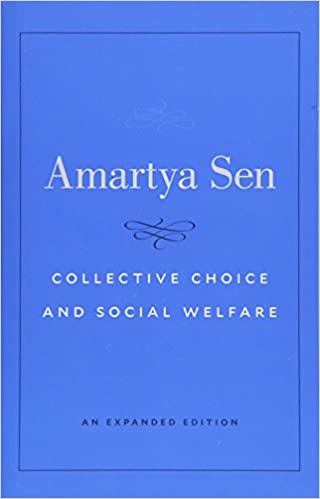
(Originally published in 1970, this classic study has been...)
Originally published in 1970, this classic study has been recognized for its groundbreaking role in integrating economics and ethics, and for its influence in opening up new areas of research in social choice, including aggregative assessment. It has also had a large influence on international organizations, including the United Nations, notably in its work on human development. The book showed that the "impossibility theorems" in social choice theory - led by the pioneering work of Kenneth Arrow - do not negate the possibility of reasoned and democratic social choice.
https://www.amazon.com/Collective-Choice-Social-Welfare-Expanded/dp/0674919211/ref=sr_1_5?dchild=1&keywords=Amartya+Sen&qid=1611839284&sr=8-5
1970
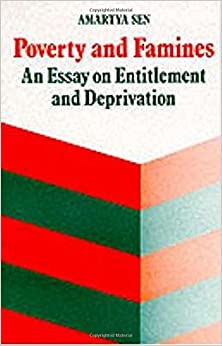
(This book focuses on the causes of starvation in general ...)
This book focuses on the causes of starvation in general and famines in particular. The traditional analysis of famines is shown to be fundamentally defective, and the author develops an alternative analysis.
https://www.amazon.com/Poverty-Famines-Essay-Entitlement-Deprivation/dp/0198284632/ref=sr_1_6?dchild=1&keywords=Amartya+Sen&qid=1611839284&sr=8-6
1981
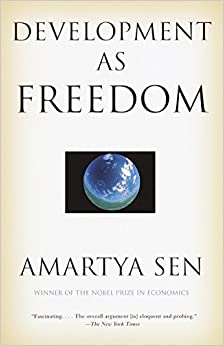
(Freedom, Sen argues, is both the end and most efficient m...)
Freedom, Sen argues, is both the end and most efficient means of sustaining economic life and the key to securing the general welfare of the world's entire population. Releasing the idea of individual freedom from association with any particular historical, intellectual, political, or religious tradition, Sen clearly demonstrates its current applicability and possibilities. In the new global economy, where, despite unprecedented increases in overall opulence, the contemporary world denies elementary freedoms to vast numbers - perhaps even the majority of people - he concludes, it is still possible to practically and optimistically restain a sense of social accountability.
https://www.amazon.com/Development-as-Freedom-Amartya-Sen/dp/0385720270/ref=sr_1_1?dchild=1&keywords=Amartya+Sen&qid=1611839284&sr=8-1
1999
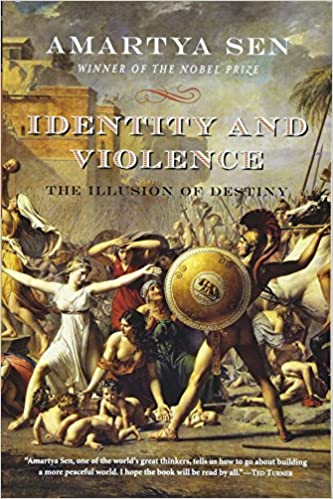
(In this sweeping philosophical work, Amartya Sen proposes...)
In this sweeping philosophical work, Amartya Sen proposes that the murderous violence that has riven our society is driven as much by confusion as by inescapable hatred. Challenging the reductionist division of people by race, religion, and class, Sen presents an inspiring vision of a world that can be made to move toward peace as firmly as it has spiraled in recent years toward brutality and war.
https://www.amazon.com/Identity-Violence-Illusion-Destiny-Issues/dp/0393329291/ref=sr_1_3?dchild=1&keywords=Amartya+Sen&qid=1611839284&sr=8-3
2006
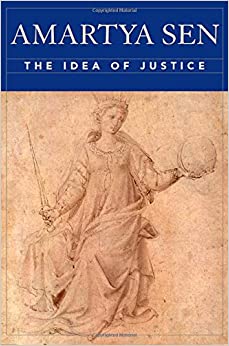
(Social justice: an ideal, forever beyond our grasp; or on...)
Social justice: an ideal, forever beyond our grasp; or one of many practical possibilities? More than a matter of intellectual discourse, the idea of justice plays a real role in how - and how well - people live. And in this book the distinguished scholar, Amartya Sen offers a powerful critique of the theory of social justice that, in its grip on social and political thinking, has long left practical realities far behind. The transcendental theory of justice, the subject of Sen's analysis, flourished in the Enlightenment and has proponents among some of the most distinguished philosophers of our day; it is concerned with identifying perfectly just social arrangements, defining the nature of the perfectly just society. The approach Sen favors, on the other hand, focuses on the comparative judgments of what is "more" or "less" just, and on the comparative merits of the different societies that actually emerge from certain institutions and social interactions. At the heart of Sen’s argument is a respect for reasoned differences in our understanding of what a "just society" really is. People of different persuasions - for example, utilitarians, economic egalitarians, labor right theorists, no-nonsense libertarians - might each reasonably see a clear and straightforward resolution to questions of justice; and yet, these clear and straightforward resolutions would be completely different. In light of this, Sen argues for a comparative perspective on justice that can guide us in the choice between alternatives that we inevitably face.
https://www.amazon.com/Idea-Justice-Amartya-Sen/dp/0674060474/ref=sr_1_2?dchild=1&keywords=Amartya+Sen&qid=1611839284&sr=8-2
2009
Amartya Sen was born on November 3, 1933, in Santiniketan, India. Sen's father, Ashutosh, was a professor of chemistry at Dhaka University, and his mother, Amita, was a writer; she also edited a literary magazine in Bengal, India.
Amartya Sen began his formal education at St. Gregory's School.
Sen was educated at Presidency College in Calcutta (now Kolkata). He went on to study at Trinity College, Cambridge, where he received a Bachelor of Arts (1955), a Master of Arts (1959), and a Doctor of Philosophy (1959).
Amartya Sen taught economics at a number of universities in India and England, including the Universities of Jadavpur (1956-1958) and Delhi (1963-1971), the London School of Economics, the University of London (1971-1977), and the University of Oxford (1977-1988), before moving to Harvard University (1988-1998), where he was a professor of economics and philosophy. In 1998 he was appointed master of Trinity College, Cambridge - a position he held until 2004 when he returned to Harvard as Lamont University Professor.
Welfare economics seeks to evaluate economic policies in terms of their effects on the well-being of the community. Sen, who devoted his career to such issues, was called the "conscience of his profession." His influential monograph Collective Choice and Social Welfare (1970) - which addressed problems such as individual rights, majority rule, and the availability of information about individual conditions - inspired researchers to turn their attention to issues of basic welfare. Sen devised methods of measuring poverty that yielded useful information for improving economic conditions for the poor. For instance, his theoretical work on inequality provided an explanation for why there are fewer women than men in some poor countries in spite of the fact that more women than men are born and infant mortality is higher among males. Sen claimed that this skewed ratio results from the better health treatment and childhood opportunities afforded to boys in those countries.
Sen's interest in famine stemmed from personal experience. As a nine-year-old boy, he witnessed the Bengal famine of 1943, in which three million people perished. This staggering loss of life was unnecessary, Sen later concluded. He believed that there was an adequate food supply in India at the time but that its distribution was hindered because particular groups of people - in this case, rural laborers - lost their jobs and therefore their ability to purchase the food. In his book Poverty and Famines: An Essay on Entitlement and Deprivation (1981), Sen revealed that in many cases of famine, food supplies were not significantly reduced. Instead, a number of social and economic factors - such as declining wages, unemployment, rising food prices, and poor food-distribution systems - led to starvation among certain groups in society.
Governments and international organizations handling food crises were influenced by Sen's work. His views encouraged policymakers to pay attention not only to alleviating immediate suffering but also to finding ways to replace the lost income of the poor - as, for example, through public-works projects - and to maintain stable prices for food. A vigorous defender of political freedom, Sen believed that famines do not occur in functioning democracies because their leaders must be more responsive to the demands of the citizens. In order for economic growth to be achieved, he argued, social reforms - such as improvements in education and public health - must precede economic reform.
Sen was a member of the Encyclopædia Britannica Editorial Board of Advisors from 2005 to 2007. In 2008 India donated $4.5 million to Harvard University to establish the Amartya Sen Fellowship Fund to enable deserving Indian students to study at the institution's Graduate School of Arts and Sciences.
Amartya Sen's awards include Bharat Ratna (India); Commandeur de la Legion d'Honneur (France); the National Humanities Medal (United States); Ordem do Merito Cientifico (Brazil); Honorary Companion of Honour (United Kingdom); the Aztec Eagle (Mexico); the Edinburgh Medal (United Kingdom); the George Marshall Award (United States); the Eisenhower Medal (United States); and the Nobel Prize in Economics.
Amartya Sen's books have been translated into more than thirty languages, and include Choice of Techniques (1960), Growth Economics (1970), Collective Choice and Social Welfare (1970), On Economic Inequality (1973, 1997); Poverty and Famines (1981); Utilitarianism and Beyond (jointly with Bernard Williams, 1982); Choice, Welfare and Measurement (1982), Commodities and Capabilities (1985), The Standard of Living (1987), On Ethics and Economics (1987); Hunger and Public Action (jointly with Jean Drèze, 1989); Inequality Re-examined (1992); The Quality of Life (jointly with Martha Nussbaum, 1993); Development as Freedom (1999); Rationality and Freedom (2002); The Argumentative Indian (2005); Identity and Violence: The Illusion of Destiny (2006), The Idea of Justice (2009), An Uncertain Glory: India and Its Contradictions (jointly with Jean Drèze, 2013), and The Country of First Boys (2015).
Amartya Sen is a much-admired, award-winning economist, writer, and philosopher. A voice of the poor and malnourished, tirelessly engrossed in the problems of the society's poorest people, he has devised practical solutions to prevent food shortage and starvation. This Nobel laureate has helped create the United Nations Human Development Index and was featured on Time Magazine's list of the World's 50 Most Influential People Who Matter. A leading intellectual, Sen’s books have been translated into more than thirty languages across the world. Some of his noteworthy publications include Development as Freedom, Poverty and Famines: An Essay on Entitlements and Deprivation, On Economic Inequality, Inequality Reexamined, The Argumentative Indian, and The Idea of Justice. Currently a Professor of Economics and Philosophy at Harvard University, Sen has also been a Professor at the London School of Economics and The University of Oxford. He has won an array of laurels including the Bharat Ratna, the highest civilian award in India. Committed sincerely to the cause of ending poverty and deprivation, this celebrated economist, is the sixth Indian to receive a Nobel and the first Asian recipient of the Economics Prize.
(Originally published in 1970, this classic study has been...)
1970(Social justice: an ideal, forever beyond our grasp; or on...)
2009(In this sweeping philosophical work, Amartya Sen proposes...)
2006(Freedom, Sen argues, is both the end and most efficient m...)
1999(This book focuses on the causes of starvation in general ...)
1981Sen is an atheist and holds that this can be associated with one of the atheist schools in Hinduism, the Lokayata.
Sen has never disguised the politics in his economics and the economics in his politics. While he has never described himself as a Marxist, he has also not been shy of declaring that his "politics is of the Left." Indeed, during his days at the Delhi School of Economics, Amartya Sen was an active member of the Marx Club discussing and debating various aspects of the theory and practice of Marxism including the Great Proletarian Cultural Revolution of China, a phenomenon that was enthusiastically (and perhaps prematurely) endorsed by his one-time mentor, Joan Robinson. Sen even attended Marxist-Leninist groups that discussed the Little Red Book of Quotations of Chairman Mao.
However, none of these and his participation in other "good causes" prevented Amartya Sen from following the classic dictum of Karl Marx himself: omnibus disputandum - question everything: the only absolute is that there are no absolutes. Thus, for instance, while greatly admiring different aspects of the achievements of socialist systems in terms of education, health care and other aspects of the development of human capabilities, Sen also focused on the lack of democracy and public information which resulted in the avoidable loss of life through famines in China and elsewhere. Other more orthodox Left economists pointed out that perhaps Sen was making "democracy" into an absolute; that there was no reason to suppose that only formal parliamentary democracy was sufficient to bring about transparency and public knowledge but Sen stuck his ground and with reasonable cause.
Amartya Sen has treated economics not only as a science, dismal or otherwise but as a philosophy, as something which cannot be separated from its ethical dimension.
Quotations:
"The identity of an individual is essentially a function of her choices, rather than the discovery of an immutable attribute."
"Poverty is not just a lack of money; it is not having the capability to realize one's full potential as a human being."
"Economic growth without investment in human development is unsustainable - and unethical."
"The success of a society is to be evaluated primarily by the freedoms that members of the society enjoy."
"Empowering women is key to building a future we want."
"I believe that virtually all the problems in the world come from inequality of one kind or another."
Amartya Sen has served as president of the Econometric Society (1984), the International Economic Association (1986-1989), the Indian Economic Association (1989), and the American Economic Association (1994).
Sen does admit to enjoying chatting, looking at works of art, and going on long walks. "I like doing what most people like doing," he says.
In 1960, Sen married Nabaneeta Dev, whom he had met in India. She came to England in 1953, and he proposed to her soon after; they later had two daughters, Antara and Nandana. Antara became a journalist and editor of a literary and political magazine in Delhi, India; Nandana became an actress and film director in New York and Bombay, India.
Sen had married his second wife, Eva Colorni, an Italian economist, in 1978, but she died of cancer in 1985, leaving him with a ten-year-old daughter, Indrani, and an eight-year-old son, Kabir.
In 1991, Sen married Emma Rothschild, an economic historian. He taught at Trinity College in Cambridge, England as a Master for six years.
